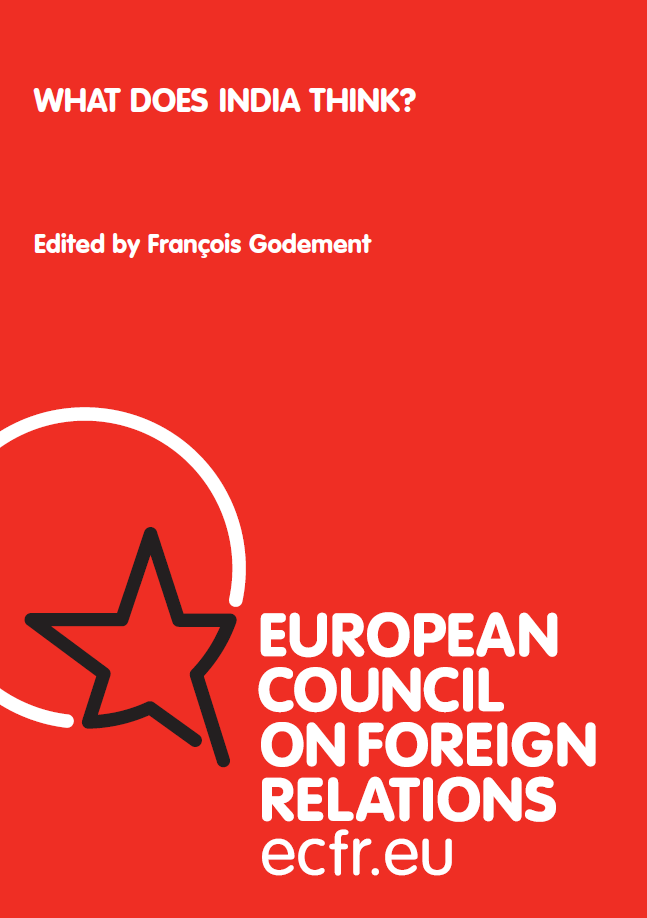What does India think?
India is changing, and Europe is missing out. A new collection of essays explores India’s economic, domestic and foreign policy prospects
The European Union is simply not engaging India which means that the EU is missing out on an historic opportunity to build stronger relationships with the world's fastest growing economy
‘What Does India Think?’, edited by François Godement, director of ECFR’s Asia & China programme, brings together leading Indian politicians and analysts to explore their country’s state of affairs, economic prospects and new international activism. It follows a series of research trips involving prominent European politicians and journalists.
In his introduction to the report, Godement notes that there is a conspicuous absence of serious engagement between India and the European Union, pointing out that there has been no EU-India summit since 2012, and that India’s globetrotting PM Narendra Modi will have visited four European capitals by the end of November 2015, but not Brussels.
A number of Indian contributors highlight the damaging effect that this lack of engagement has had on Indian perceptions of the European Union. Such apathy stands in stark contrast to the engagement of other major world powers: three successive US administrations have created a regional alliance to balance China’s military rise, Japan is a major investor into India’s infrastructure and even China, which has strong rivalries with India, is seeking to bring India into its new Silk Road initiative.
Godement highlights three key areas where greater cooperation between Europe and India would be beneficial. On security, he asserts, both sides share a common interest in preventing state collapse in Afghanistan and in security on the Indian Ocean littoral. On economic matters, with China’s slowing growth, India is now the fastest growing economy, but one whose high rates of CO2 emissions are a concern to Europeans. And on the digital economy, India is a major player to be engaged if Europe wants to live up to its own aspirations in this field.
Visit 'What does India think?' dedicated website, where you can navigate through the different essays and find additional multimedia resources.
Contributors:
- INTRODUCTION – François Godement
- WHAT DOES INDIA THINK? – Lord Meghnad Desai
- INDIA'S GANDHIAN FOREIGN POLICY – Deep K. Datta-Ray
- THE INDIA THAT MADE MODI – Ashok Malik
- THE CHALLENGES OF BASIC EDUCATION IN INDIA – Rukmini Banerji
- WHAT DO INDIA'S CITIZENS WANT? Bibek Debroy
- CAN MODI DELIVER GOOD GOVERNANCE? – Gurcharan Das
- INDIA'S POLITICS AND THE POOR – Himanshu
- THE FALSE DEBATE ON INDIA'S ENERGY CONSUMPTION – Samir Saran & Vivan Sharan
- IMAGINING SMART CITIES IN INDIA – Arunabha Ghosh & Mohit Sharma
- INDIA'S STRATEGIC OPPORTUNITIES – Manish Tewari
- INDIA'S STRATEGIC DIFFIDENCE – Bharat Karnad
- CHINA, INDIA, PAKISTAN AND A STABLE REGIONAL ORDER – Happymon Jacob
- MODI'S APPROACH TO CHINA AND PAKISTAN – Rahul Roy-Chaudhury
- THE FTA: A STRATEGIC CALL FOR THE EU AND INDIA? – Sangeeta Khorana
- CONCLUSION: A FRESH START FOR EUROPE AND INDIA
This project was supported Robert Bosch Stiftung
The European Council on Foreign Relations does not take collective positions. ECFR publications only represent the views of their individual authors.



